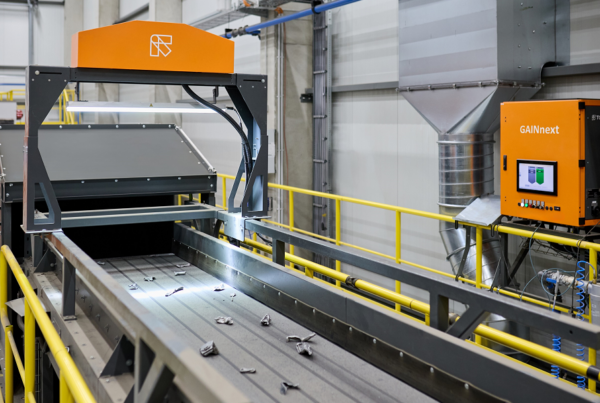The new year of 2025 only began a few months ago, but the year is already shaping up to be an action-packed one for the recycled materials industry. Who better to rise to meet the challenges and opportunities of the year than the four leaders of the Recycled Materials Association (ReMA)?
ReMA News had the chance to sit down with the association’s four officers, Colin Kelly (Chair), Andy Golding (Chair Elect), Neil Byce (Vice-Chair), and Sean Daoud (Secretary/Treasurer) to discuss the administration’s vision and goals for 2025, as well as ReMA’s 2025 Fly-In, a major early success for the industry.
Q: What is your vision for ReMA in 2025?
Colin: Right now, we’re working to get a hold of the rapidly changing landscape of trade in 2025. Tariffs, retaliatory tariffs, and shipping concerns are just some of the issues we’re facing. We’re taking immediate steps to confront these challenges.
Neil: In the face of these changing times, ReMA has been a stabilizing constant for the industry. Uncertainty acts as the ultimate equalizer—it doesn’t matter if you’re a six-person operation or a publicly traded company. These changes are coming at everyone at lighting speed and without the assistance of ReMA’s staff, who are dialed into what’s going on, we would be lost in a sea of questions. Joining ReMA and getting involved at the chapter or federal level is one of the best things you can do for your business to make sure you’re here tomorrow and the next day.
Sean: Some recyclers may not realize how these changes impact their business. Even if they’re only focused on domestic sales and trade, these tariffs can still impact your business; it expands through the globe. If we aren’t trading freely with Asia, Europe, and other parts of the world, then the value of the material we’re selling will decrease. At the end of the day, these changes impact all our members, and we need to support them.
Q: In addition to getting a handle on trade issues facing the industry, what else do you want to accomplish this year?
Colin: With the support of the executive committee, I want to continue our work developing future association leaders. A year ago, we examined how we educate our leader coming into the board of directors and we realized that we wanted to make improvements. We want to avoid situations where chapters seek permission for a leader to stay for another term because they don’t have a good candidate to take over. We want people to get excited about getting involved in the association.
And we’re still working on the other major issues facing the industry. We’re still focused on electric vehicles and how to process and handle them safely. ReMA recently hired a new vice president of safety, Stefan de Wilde, and he’s planning to visit member facilities this year to learn more about the industry.
ReMA’s core values remain the same; we’re working to put the right group in front of them. I consider myself lucky to have Andy, Neil, and Sean behind me because their vision is very much in line with mine. I think if anyone is prepared to weather the storm, we’re the industry to do it. Resiliency is so important, and our members show that.
Q: On Wednesday, February 26, 2025, ReMA held its Congressional Fly-In in Washington, D.C., with over 150 recyclers meeting with lawmakers to highlight the industry’s impact and its new brand identity, “America is Made with Recycled Materials.” What were some major takeaways from the Fly-In?
Colin: I’ve been going to hill day for 18 years representing my company and the industry. Every year I would land at Reagan National airport and get my bags, get a cab, and head to a hotel. This year while waiting for my luggage, I saw a video of our industry playing at baggage claim. When I got my Lyft, I saw a cab and a double decker bus roll by featuring ReMA’s logo. Seeing our presence in Washington, DC gave me a sense of great pride in the association and our industry.
I’ve never felt as prepared to meet with legislators and their staff as I did this year. ReMA’s advocacy team outdid itself in terms of the training provided. Kristen Hildreth, ReMA’s vice president of government relations and public policy, prepared us well. A highlight of my administration was getting to speak at the Smithsonian when the Proler family brought in parts of a shredder. That night was one I’ll remember for a long time. I want to thank the Proler family and Nucor Steel for their commitment to the event.
Andy: This year I felt an enormous sense of pride. I wanted to tell everyone on the Hill that I was part of the recycled materials industry, and I wanted to tell our story and why we were important. And for the day to end at one of the country’s strongest, most credible institutions, for what I would consider the induction of the recycled materials industry into the Smithsonian could not have topped it better. I couldn’t be more excited about who I was and what I was representing, it was palpable everyone and an enormous sense of pride, it beamed off all of us.
Sean: I’ve grown up in this business and I’ve always known that I wanted to be part of the industry. But going to the Fly-In this year really gave me an enormous sense of pride to be in the recycled materials industry. Knowing that when we talk to legislators and regulators, we can tell them confidently that our industry matters, our commodities are important, and we make a positive impact on the country.
This is Part One of the two-part series featuring ReMA’s national officers. Part Two will focus on ReMA 2025 – The Show.









